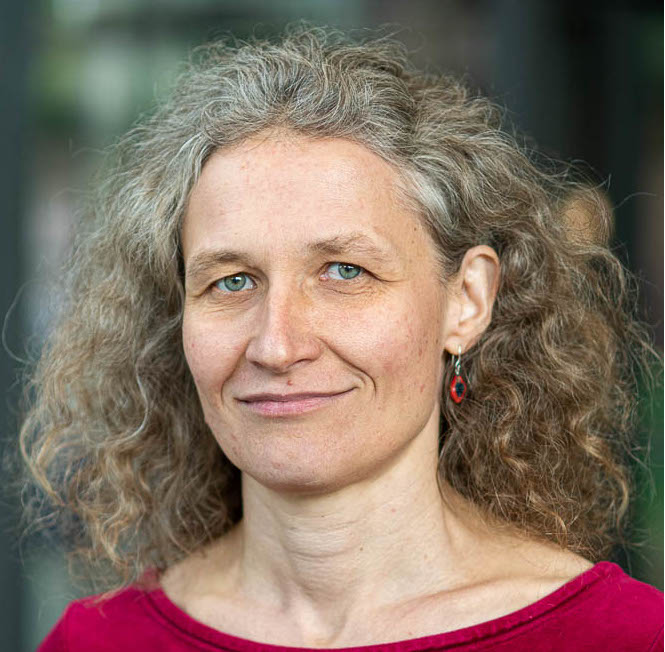Prof. Dr. Birgit Müller
Contact
Head of Working Group POLISES (POLicy Instruments and Socio-Environmental Systems under global change)
Helmholtz Centre for Environmental Research - UFZ
Department of Ecological Modelling
Permoserstr. 15
04318 Leipzig
Germany
Building 1, room 2.04
Tel.: +49 341 6025 2664
birgit.mueller@ufz.de

Research Interests
Use of process-based models for an enhanced understanding and governance of social-ecological systems under global change:
- Exploring dynamics of socio-environmental resource systems under uncertainty
- Effects of policy instruments for global food security and for coping with climate risk (such as weather insurances) on socio-environmental systems (SES)
- Adequate representation of human decisions in agent-based models for natural resource use Journal Club
- Advancement of methods related to incorporate cross-scale effects in land use models
- Potential of SES models as tool of thinking and tool for communication in inter- and transdisciplinary research
Current Projects
- POLISES - Global food security policies and
their social-ecological side effects in regions prone to global change
Project Website POLISES - INSURANCEGRASS -Assessment of formal, natural and social insurances: how to cope best with impacts of extreme events on grasslands for sustainable farming systems? (D-A-CH Program, April 2022 – March 2025).
- BESTMAP - Behavioural, Ecological and Socio-economic Tools for Modelling Agricultural Policy (September 2019 - August 2023).
- NamTip - Understanding and Managing Desertification Tipping Points in Dryland Social-Ecological Systems – A Namibian Perspective (March 2019 - February 2022).
- SESYNC Pursuit: Testing and extending Ostrom’s frameworks: quantitative synthesis and modeling of social-ecological dynamics (2017- ongoing)
Finished Projects
- DFG funded Project SEEMI - "Effects of microinsurance on informal safety nets and on strategies for natural resource use – a model-based analysis" (March 2017 - August 2020)
- Junior Research Group POLISES - Global food security policies and their social-ecological side effects in regions prone to global change (2014-2019) Short description
Project Website POLISES - Collaborative SESYNC-UFZ-IDiv project: Synthesis of micro-scale human decision making to mitigate risks to ecosystem services
- Sustainability of (Post-)Nomadic Resource Utilization Under Global Change - Conceptual Understanding Through Ecological-Economic Modelling (2008-2012)
- Ecological Economics: Modelling and conceptual foundation, with an example of grazing in semi-arid regions (2004-2007)
Memberships
- Member of external advisory board of the National Socio-Environmental Synthesis Centre (SESYNC) Annapolis, US (since 2018)
- Member of Editorial Board of open-access journal SESMO – Socio-Environmental Systems Modelling (since 2019)
- Member of Steering Committee of Global Land Program Working Group: “Large-scale Behavioural Models of Land Use Change”
Publications
Latest Publications:
Towards reusable building blocks for agent-based modelling and theory development
Environ. Modell. Softw. 175 , art. 106003 10.1016/j.envsoft.2024.106003
Farm typologies for understanding farm systems and improving agricultural policy
Agric. Syst. 213 , art. 103800 10.1016/j.agsy.2023.103800
Wind erosion in European agricultural landscapes: More than physics
People Nat. 5 (1), 34 - 44 10.1002/pan3.10418
Scale decisions and good practices in socio-environmental systems modelling: guidance and documentation during problem scoping and model formulation
Socio-Environmental Systems Modelling 5 , art. 18563 10.18174/sesmo.18563
Determinants of household vulnerability in networks with formal insurance and informal risk-sharing
Ecol. Econ. 212 , art. 107921 10.1016/j.ecolecon.2023.107921
A framework for conceptualizing and modeling social-ecological systems for conservation research
Biol. Conserv. 275 , art. 109769 10.1016/j.biocon.2022.109769
Typologies of European farmers: approaches, methods and research gaps
Reg. Envir. Chang. 22 (2), art. 43 10.1007/s10113-022-01899-y
Upscaling in socio-environmental systems modelling: Current challenges, promising strategies and insights from ecology
Socio-Environmental Systems Modelling 4 , art. 18112 10.18174/sesmo.18112
Using Bayesian belief networks to investigate farmer behavior and policy interventions for improved nitrogen management
Environ. Manage. 69 (6), 1153 - 1166 10.1007/s00267-022-01635-6
Wikis as collaborative knowledge management tools in socio-environmental modelling studies
Environ. Modell. Softw. 158 , art. 105538 10.1016/j.envsoft.2022.105538
D6.1 Analysis of needs and capacity of different audiences including policy makers, expert practitioners and other modellers
ARPHA Preprints 10.3897/arphapreprints.e82715
Improving the design of climate insurance: combining empirical approaches and modelling
Clim. Dev. 14 (9), 804 - 813 10.1080/17565529.2021.2007837
Integrating equity considerations into agent-based modeling: A conceptual framework and practical guidance
JASSS 25 (3), art. 1 10.18564/jasss.4816
Deliverable D2.2 BESTMAP Conceptual Framework Design & Architecture
ARPHA Preprints 10.3897/arphapreprints.e82404
Full list of publications: Publications
